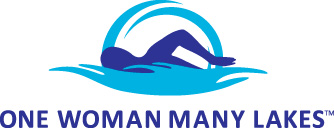Dedicated Women with Metastatic Breast Cancer
SHARE YOUR STORY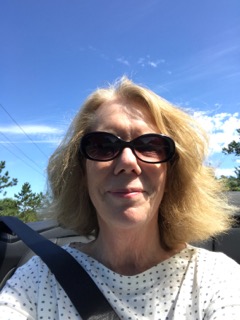
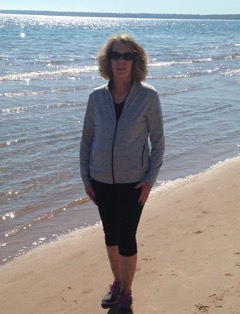
Linda Cook
- My story begins in 2007 when I was diagnosed with early stage breast cancer, which led to bilateral mastectomies and hormonal therapy, after biopsy showed invasive ductal cancer. Lymph nodes clear. I truly thought I had beat cancer. My sister died from mets to her brain and my mom from breast cancer. I was the poster girl for early detection. Well….maybe not.
- In 2009 I felt pain in my back and after a series of scans and spine/rib biopsy, we discovered that the cancer had metastasized to my spine and upper ribs. Radiation and new treatments followed. Here I am 10 years out from diagnosis and 8+ years from mets diagnosis. In the past 8 years, I have had 5 separate radiation treatments, to my ribs, spine and hips, and a 10 hour spinal fusion surgery in 2014 when rods and screws were placed in my spine to prevent paralysis. Today my mets are in my spine, ribs, lumbar, hips, and liver.
- We need research to discover newer and more effective treatments for MBC. I have an incredible support system in my family and friends and I continue to look forward to seeing my son get married and celebrate his achievements. My husband and I are retired and try to travel when we can. I founded a fund named Project Embrace where donations are used to purchase blankets for cancer patients receiving chemo or radiation.

Bernadette Priestley
It was October of 2017, at the age of 37, that I found a lump in my breast. I have two small boys. I was happy, relatively healthy and loved being at home with my kids. I remember after all the scans and biopsies asking what would happen if the lump came back benign and I clearly remember my surgeon looking right at me and saying ‘It won’t.’ I felt my heart sink. I was prepared for a rough year that would include a double mastectomy, chemo and radiation but then, I felt sure, I would beat it. I am young and have a lot to live for. It wasn’t until after surgery that I had a PET scan that showed that the cancer had already spread to my bones. I was stage IV out of the gate. This wasn’t going to be a year-long battle, it was going to be a lifetime of treatments to try and control the spread of my disease.
To say your first year of having MBC is filled with ups and downs is the understatement of the century. Our new normal isn’t normal at all. We have had hurdle after hurdle thrown our way and somehow we manage to cope. My boys are so young and don’t understand all that is going on and for that I am grateful.
It wasn’t that long after I was diagnosed that I realised the need for more research and fundraising. The stats on metastatic breast cancer are shocking. You can’t race for a cure while you ignore stage IV. I don’t know a single person that isn’t ‘aware’ of breast cancer. We don’t need more awareness, we need a cure. Research is the ONLY way to keep me alive to see my boys grow up. Is getting my youngest to kindergarten too much to ask? I think not. I am not done being a mum, a wife, a sister or a daughter.
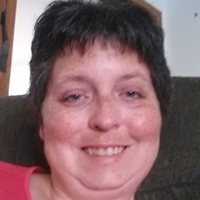
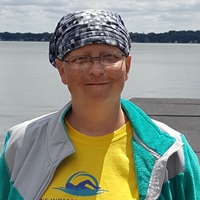
Alecia Haffery
My story began in December 2013. I was having awful pain in my shoulder. Being uninsured, I knew my only option was to go to urgent care where I was hoping they wouldn’t turn me away. After seeing the pain I was in, the doctor decided to do a Breast exam. And from there it was on. They felt something in my armpit and they quickly called to have a biopsy that evening. Mind you, this whole time I am by myself at the hospital. I had so much going through my head.
By the time I returned to my room they were there with my results. The few words anyone dreads to hear. You have cancer. Say what?! I was shocked to say the least. They had scheduled me for an appointment the very next day with an oncologist. I remember that appointment like it was yesterday. At this time I had my sister and mom with me so that was a relief. As I sat there listening, my doctor told me I had stage 4 Metastatic Breast Cancer. There is no cure. After going through genetic testing we found that I carry the BRCA gene. I was HER2+ and had no clue what all this meant. I was grateful to have a sweet lady who took her time with me to explain what all this meant. I had not had any surgeries or previous cancer.
So here I was at 31 yrs old and I had cancer that can’t be treated. It wasn’t the best Christmas that year for sure. But, it’s been almost 3 years and I’m still here! I haven’t given up hope yet. I have 4 nieces and nephews that I want to see grow up! They are a big part of what keeps me going everyday.
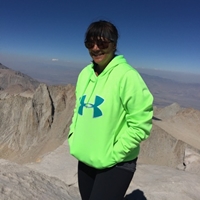
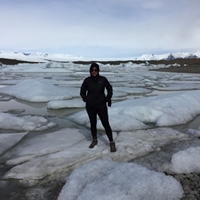
Lesley Glenn
I am a wife, mother, daughter, crafter, artist, hiker, traveling adventurer, and was diagnosed early stage IIB, ER/PR+, HER 2 – , grade 3 breast cancer, the day before Thanksgiving in 2012 and went on to be diagnosed with stage IV mets to my bones in May of 2013. I am what is considered “oligometastatic” meaning that I have 5 or less spots of metastatic cancer. It was at that time, that I heard for the first time the words “incurable.” What I thought was only going to be a 8-9 month battle dealing with early stage cancer, now was going to be a life long journey.
I decided I was going to “THRIVE.” I took control of my treatment, educating myself on metastatic disease, and since 2014 have decided my own treatment plan. One of the pivotal ways, I thrive, is hiking, traveling and being outdoors. In 2015, I trained to climb the highest mountain in the contiguous United States, Mt. Whitney. I accomplished that goal on September 21, 2015. Getting to the summit of that mountain changed the trajectory of my life and how I wanted to live with cancer, knowing that it would not have me, spiritually or mentally. Since then, I continue to hike mountains.
I have been NED since February 2014 and hope to reach the 5 year mark to be considered an exceptional responder to treatments. Until then, I will continue to thrive…advocate for a cure through my outdoor activities, and live one day at a time with grace and thanksgiving.
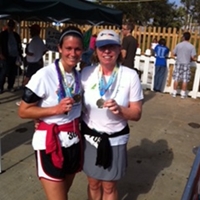
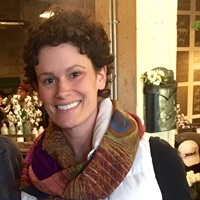
Leslie Falduto
I was 31 years old, a mother to an almost two year old, RN and married. We had just moved to suburban Chicago when I found a lump under my armpit while showering. I was young, active, breastfed my son, and had no history of breast cancer in my family. With all that being said, I found out that I had breast cancer, triple positive, no family history, and not gene positive.
October 3, 2008 I started A/C chemo. In December of 2008 I had a bilateral mastectomy, Taxol, Herceptin, Tamoxifen, and several treatments of radiation to my chest wall. By April of 2009 I was done with the most rigorous part of my treatment and in 2010 had a clear PET scan.
I trained and ran for 2 1/2 marathons in 2010 and 2011. In 2012 I got the OK to get pregnant by my oncologist. Our second son was born in September 2012. Life was great. I had 2 healthy sons. I was working full-time, and feeling fantastic.
September of 2014 I was at work and started to not feel well. By the time I got help my right leg was shaking uncontrollably. I lost consciousness. When I came to the doctors and nurses told me I had a tonic-clonic seizure and that the MRI showed a benign tumor between the two hemispheres of my brain. September 11, 2014, six years to the day that I found my lump in my armpit, I was going in for brain surgery. My neurosurgeon had to piece-meal the tumor out. He was confident that he had gotten all of it and that it was metastatic breast cancer. During one of my scans they found out that the breast cancer had also spread to my right lung and spine. My oncologist told me that I should have my ovaries and fallopian tubes removed, since once again my tumor was triple positive (ER/PR/HER2) and started Taxotere, Herceptin, Perjeta, and Zometa. I’m currently NED and continue to enjoy time with my family. In all of this I keep hope, do the things I love-like running and yoga-and continue to make memories
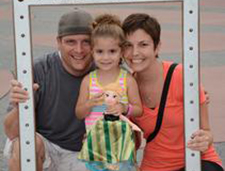
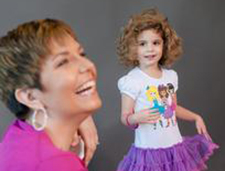
Heather McManamy
I have had the cancer bomb dropped on me twice, in the past two years. The first time, I was 33, living my awesome life, in the middle of planning my daughter’s second birthday party. I never thought about cancer. I certainly never thought it could happen to me. Then, one day at work, I got a phone call and she said, “I’m sorry. It’s breast cancer.” The only way to describe that was it was like a bomb went off. That was the day that old life, that old person was gone forever.
I spent a year adjusting to my “new normal”. I had a double mastectomy, six months of brutal chemo, reconstruction surgery and was just finishing up six months of targeted chemo, when the bomb was dropped on me again. This time, it was the stage four bomb. This means there are a lot of treatments, but no cure. Luckily, I knew the numbers: 30% of early stage women go on to become stage four. I had prepared myself. But that doesn’t make this much easier. I knew my cancer was likely to return, but hadn’t expected it to metastasize so soon. It set up shop extensively in my liver and is throughout my bones. While there is no way to know for sure how much time I have left (this is all trial and error and completely unique to each individual), the median survival is around two years. I am terminally ill.
With my diagnosis, I was shocked by how few people knew what metastatic cancer was (yes, I did catch it early!). And I was even more shocked to see how little money goes to funding research for the only breast cancer that kills. No one likes to talk about us and we often feel forgotten. I am in chemo for the rest of my life, enduring side effects that make life quite difficult. Each treatment WILL stop working at some point and then it is onto the next. My hope is to ride out each treatment long enough that maybe I will be here for new options.
We have been truly living life and enjoying every beautiful moment. My personal goal is to live long enough to see my daughter, Bri, start kindergarten in 2016. Most patients get nine months out of each treatment…I am nine months into the new diagnosis and already on my third treatment. This is not good. We need more options and research can help make that happen. No matter how much time I get with my family, it will never be enough. But, with research, maybe I can live to see another birthday, another anniversary…Bri’s first day of first grade. Please help us hold onto that hope.
Read more about Heather in Brava Magazine
Heather passed away December 15, 2015. Click here to read her obituary that she wrote. She also wrote a book “Cards for Brianna: A Lifetime of Lessons and Love from a Dying Mother to Her Daughter” before her passing. Click here to order.
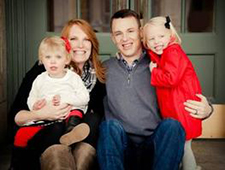
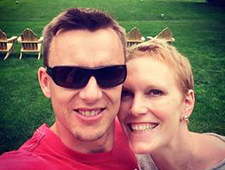
Maggie Younggren
Diagnosed stage IIA November 2013, re-diagnosed stage IV December 2014
I am a mother, a wife, a friend, a coworker, a leader, a believer in living the dream – and I’m a stage IV Metastatic Breast Cancer thriver. I found a lump in my right breast during a self exam (ladies, if you get nothing else from this, please make sure you are doing these on a regular basis). After a mammogram and ultrasound, we made the choice to have the mass removed. The mass showed signs of invasive ductal carcinoma and ductal carcinoma in situ. I then tested negative for the BRCA gene, made the move to get my lymph nodes removed (2 of 3 with cancer) putting me at stage IIA. Four rounds of Adriamycin Cytoxan then four more of Taxol, another surgery to get clean margins, 7 weeks of radiation and then Tamoxifen to keep the ER+PR+Her2- buggers at bay.
Unfortunately, my cancer is hormonal resistant, so from August to December it made a rapid move to my liver. I still remember that call, that horrible feeling and the immediate shock that followed. But as I felt with the first diagnosis, I had an extremely strong reason for living – my girls were 2 and 4, and to leave them was not an option. I am fully aware of the gravity of my diagnosis, my short life expectancy, but I also am fully aware of how hope and optimism makes a massive difference. I’ve taken an “eastern meets western” approach utilizing acupuncture, meditation, affirmations, exercise coupled with chemotherapy and now AI treatment and a new drug called Palbo. And I’ve been lucky enough to be surrounded by a community of friends and family from across the globe to help me physically, emotionally and spiritually.
I do my best to wake up every day and live for that day, that moment, for my sweet McKinley and my wild Nora, for my best friend and soul mate Luke. And I plan to do that for a long, long time.
Maggie passed away August 3, 2016.
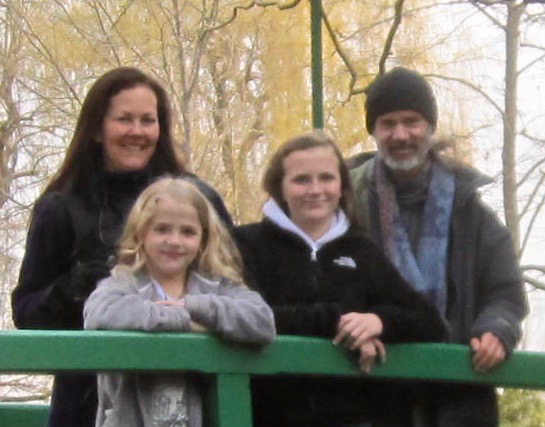
Kelly Lange
I was first diagnosed with stage 1 breast cancer in 1995 when I was 32. After lumpectomy/radiation I had five easy years, until my first recurrence in the lumpectomy scar just one week before my 5 year cancer anniversary. Like many people, I thought that if I made it five years I was in the clear.
What followed was a series of regional lymph node recurrences, many surgeries, ACT, tamoxifen, arimadex, radiation, and faslodex. The cancer spread to my skin in early 2007. I could see it getting larger every day during the weeks when we were figuring out what was going on and what we were going to do about it.
When the cancer spread to my skin in 2007 I started to feel sick and I knew I was in trouble. I could see the cancer growing every day. The weeks while we figured out the problem and what to do about it were terrifying! I started Herceptin in March and the cancer began to melt away. After two treatments we could see a remarkable improvement. I am very, very fortunate that I have been on Herceptin for more than 8 years, with excellent results and few side effects.
I know how lucky I am to have this good drug response. During my 20 year cancer journey I have met many, many women and men who weren’t as lucky as me. Each loss is heartbreaking, but I try to channel the grief into motivation to do whatever I can to solve this problem. That’s why I volunteer at METAvivor – research is our only hope.
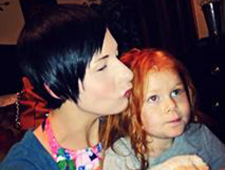
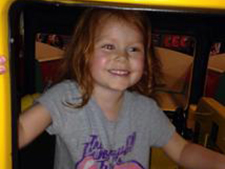
Kelli Parker
I was diagnosed at 26 with early stage Idc and underwent 5 months of grueling chemotherapy, a double mastectomy and reconstruction. Five years later, I thought I was out of the woods until my right arm started to go numb. A stage III recurrence was identified in my axilla and IMC so I underwent invasive surgery, lots more chemo, and 37 rounds of radiation. A year later, my routine scans revealed bone mets in my pelvis, femur, spine, sacrum, etc. I am currently 8 months post mets diagnosis and still working full time.
I have a beautiful 4-year-old stepdaughter whom I adore and a loving husband who married me despite the diagnosis. I am passionately committed to educating on behalf of metastatic women everywhere but especially young women as it is so poorly understood. I’m 33, a wife, mother, daughter, sister, friend, and Cancer patient. Stage IV deserves more.
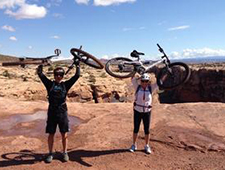
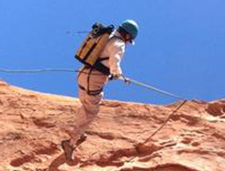
Mary Gooze
My story began in January of 2012 when I was diagnosed with breast cancer. Thankfully it was an early detection due to the yearly mammogram screening and the treatments were the customary surgery, chemotherapy and radiation that consumed nine months of my life. During that time swimming was my refuge and I would venture down to the pool with my bald head and swim as the soothing water and the repetition of the strokes gave me a temporary reprieve from thinking about cancer. It proved to be a cathartic release and physically made me stronger to withstand the harsh weekly treatments.
A mere twenty months after my last radiation treatment I received the call that the pain in my hip was cancer. The breast cancer had metastasized to the bones and now the real fight had begun. The only words I clearly remember my oncologist saying is metastatic breast cancer (Stage IV) is incurable. Prior to receiving the diagnosis I had been training to do a 2 1/4 mile swim in Lake Washington in Seattle. My first question to the doctor was, “Could I do the swim.” He gave me thumbs up even though my radiation treatment would end a mere two weeks before the swim. Fatigue tends to be the worst at that point but it would not stop me.
When I plunged into the choppy white-capped waves my first concern was not about cancer but if I could successfully reach the shoreline that appeared to be a million miles away. Stroke after stroke I felt myself getting stronger and stronger and by the time I landed on the shore, a seed was planted on how swimming could help others and me with this disease.
